|
|
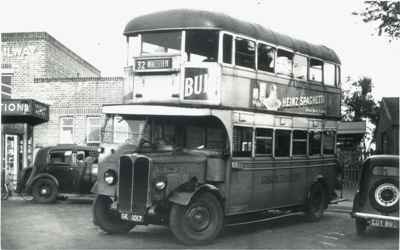 Worcester Park 2008 Worcester Park 2008
Route 32
Once a cross-London route, the 32 became a local operation
after the outbreak of the second world war, running from 1942
between St Helier and Worcester Park. After operating
Merton's last Daimler, it was withdrawn entirely in 1956 and
replaced by the 127.
Elderly and in poor shape,
ex-Tilling ST941 at Worcester Park Station on 30 Sep 48, when the
route was nominally operated by Daimlers. The bus was
withdrawn within weeks and scrapped. It was one of those
loaned outside London during the war, going to Midland Red in
December 1941 just after the Manchester Crosssleys from the 127 had
themselves gone back.
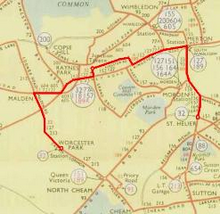 Route WORCESTER PARK via New Malden, Raynes Park, South
Wimbledon and Morden to ST HELIER.
Timetable
The 32 will operate between Worcester Park and Raynes
Park about every 20 minutes, with journeys about every hour
extended to St Helier. Timetable attached.
Main boarding points
Worcester Park Station forecourt and stop
C, Malden
Fountain stops J and K,
Raynes Park Station stops P and S (note that these are shown as
F and G on the TfL spider diagram),
Morden Station stops B and H, St Helier Avenue
Middleton Road.
Click on the map to
enlarge
Route history
Route 32, like the 93, is a route that migrated south in the
years before the second world war. It started life in
April 1917, with B-types from Merton (AL) and Turnham
Green (V) garages running between the two places via Oxford
Circus and Clapham, with a summer Sunday extension to Kew
Green.
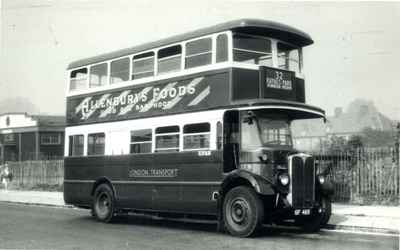 In 1918, the summer extension took the south end to
Wimbledon Common, whilst in 1919 it was Hampton Court and Hampton,
but with no service beyond central London. Summer Sunday
extensions continued to 1922, but the Sunday service ceased
completely in May 1923.
Another ST working from
Merton, this time ST91, nine days later on 9 Oct 48.
Originally a Central Area bus and converted to run on gas during
the war, ST91 was repainted Country Area green in 1945 (by which
time it had regained its petrol engine), the livery it wears here.
It looks in much better shape, and was repainted red the
following month, only to be scrapped less than a year later.
Photo © Alan
Cross
By now the route was operated by S-types. For four
years between 1926 and 1930, it was extended from Turnham Green to
Lampton, then on being cut back was extended in the south from
Wimbledon to Raynes Park. The S-types were replaced by NSs in
1931, these in turn in 1935 by STLs (AL) and STs (V).
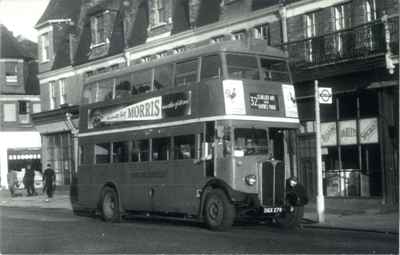 For many
years, the road paralleled the 88 between Stamford Brook and
Tooting, which was presumably why the route was cut back to Tooting
in November 1939, taking it from a trunk route needing 34 buses to
a local route requiring only 4. The northern end was
shortened again in April 1942 to Merton Garage, the route now
having no roads in common with the route introduced in 1917, but
was extended southwards to Worcester Park in peak hours. The
route changed again seven months later at the northern end to
run to South Wimbledon, and on to St Helier in the
peaks, rather than to Merton Garage.
STL1731 with 'St Helier Ave and Raynes
Park' lazy blind at Raynes Park on 31 Aug 51. This bus
was delivered new to Merton in 1936, and in 1940 received a
replacement body after bomb damage. It was to survive another
four years. The usual buses on the 32 at the time were Ds,
photo here. Photo © Alan Cross
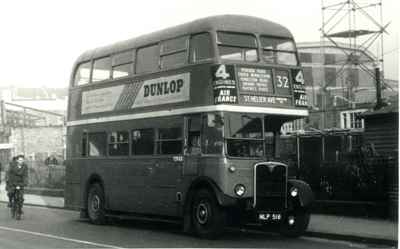 Merton continued to operate the route up to the
end, and nominally its STLs were replaced by Ds in October
1945. However, as so often occured in the years after the
war, a variety of buses ran the service in practice. November
1947 saw the St Helier service running all day, although a Sunday
service never resumed; the Saturday service was next to go,
finishing in April 1949, replaced briefly between South Wimbledon
and Worcester Park by SRT-operated route 5.
Merton's Daimlers started being replaced in September 1952,
initially by second-hand RTLs but the following month by new
RTs. Route 49 was converted first, along with the 127
where RLHs repalced the low-bridge Ds, then 88 and
77/77A , followed in turn by the 118, 157 and
152. By the end of 1953, Merton retained a handful
of Daimlers for the 32 alone. The last was D73, which
ran on the 32 on the last day of London service by utility buses, 7
Jan 54, along with two at Sutton on the 151 and 262.
On the first day of full
RT-operation, 8 Jan 54, RT4351 is smart but carries no offside
route number.
The canopy blind-box,
initially permanently lit on the RTs, is in darkness.
RTs ran the 32 for only three years.
Photo © Alan
Cross
RTs replaced the Ds, but the 32 itself was not to last much
longer. It last ran on 16 Oct 56, being replaced the next day
by a diverted and extended 127.
|
|